 Greg Kofford Books has become a significant player in Mormon studies publishing. Greg Kofford, a Utah-based investor, created the company in 2000. It was originally known for producing just a few books a year about Mormon theology and history. In the last six years it has significantly increased the number of books it produces, and has published a wider variety, including more literary works. The ideological content of the books covers a wide range of positions, and the company is seen as occupying a middle ground in terms of orthodoxy and scholarship. This profile will look at the origins of the company, its place in the wider world of Mormon studies publishing, and solicit the opinion of authors who have worked with the publisher.
Greg Kofford Books has become a significant player in Mormon studies publishing. Greg Kofford, a Utah-based investor, created the company in 2000. It was originally known for producing just a few books a year about Mormon theology and history. In the last six years it has significantly increased the number of books it produces, and has published a wider variety, including more literary works. The ideological content of the books covers a wide range of positions, and the company is seen as occupying a middle ground in terms of orthodoxy and scholarship. This profile will look at the origins of the company, its place in the wider world of Mormon studies publishing, and solicit the opinion of authors who have worked with the publisher.
Greg Kofford and the origins of Greg Kofford Books
Greg Kofford is the son of LDS business owner Lewis Kofford. The elder Kofford bought Covenant Recordings, a small LDS tape recording business in 1977 and eventually turned it into a publisher, Covenant Communications. Lewis Kofford also created his own chain of bookstores, Seagull Books & Tape, in 1987.

Greg Kofford received a BS from the University of Utah and an MBA from the Massachusetts Institute of Technology. He became a financial manager, specializing in the capital markets, hedge funds and private family office investing. He founded the corporate finance group at the Salt Lake City broker Wilson Davis. In 1990 he was brought in by his father to become the President and CEO of Seagull Books & Tape. In less than three years he oversaw a period of increased profitability and growth, expanding from 3 locations to 37 by the time he left the position in 1992. Seagull’s growth and discounting made it a major competitor to the Church-owned Deseret Book chain, and it was that competition that led to the Church’s Deseret Management Company buying Seagull and Covenant Communications from Lewis Kofford in 2006. You can read Kofford’s description of his time at Seagull and the competition with Deseret Book in this transcript of a 2009 Sunstone Symposium panel.
In 1995 Greg Kofford co-founded the investment banking firm Cogent Capital Corp in Sandy, Utah. Mark Holden, a BYU and Harvard Business School graduate, was the other co-founder, and the two have been business partners ever since. Kofford and Holden went on in 2007 to create Lanstead Investors, an equity swap provider. The firm, with offices in Sydney and London, specializes in identifying and “backing high performing management teams that can use our capital to complete significant milestones in their business.” Kofford gives a detailed explanation of his investing principles in this Mining Maven interview about investing in Australian mining.
 Kofford is a bibliophile, collecting, for example, a large number of foreign language editions of the Book of Mormon. He saw a need to publish scholarly works that other Mormon publishers were rejecting. He created Greg Kofford Books, based, like his other businesses, in Sandy, and published his first book, Blake T. Ostler‘s Exploring Mormon Thought, Vol. 1: The Attributes of God, in 2001. From 2001 to 2010 Greg Kofford Books was a minor player in Mormon studies publishing, producing on average three books a year, mostly historical and theological studies, as well as republications of historical documents and scholarly works that had gone out of print. Among the authors in this early period were two amateur historians who have become leaders in their fields. Brian Hales’s
Kofford is a bibliophile, collecting, for example, a large number of foreign language editions of the Book of Mormon. He saw a need to publish scholarly works that other Mormon publishers were rejecting. He created Greg Kofford Books, based, like his other businesses, in Sandy, and published his first book, Blake T. Ostler‘s Exploring Mormon Thought, Vol. 1: The Attributes of God, in 2001. From 2001 to 2010 Greg Kofford Books was a minor player in Mormon studies publishing, producing on average three books a year, mostly historical and theological studies, as well as republications of historical documents and scholarly works that had gone out of print. Among the authors in this early period were two amateur historians who have become leaders in their fields. Brian Hales’s  2007 book Modern Polygamy and Mormon Fundamentalism: The Generations after the Manifesto won the Best Book Award from the John Whitmer Historical Association. His 2013 series Joseph Smith’s Polygamy is among publisher’s bestselling books. Two of Brant A. Gardner’s books on the Book of Mormon have won AML awards, 2011’s The Gift and Power: Translating the Book of Mormon, in the Criticism category, and 2015’s Traditions of the Fathers: The Book of Mormon as History, in the Religious Non-Fiction category.
2007 book Modern Polygamy and Mormon Fundamentalism: The Generations after the Manifesto won the Best Book Award from the John Whitmer Historical Association. His 2013 series Joseph Smith’s Polygamy is among publisher’s bestselling books. Two of Brant A. Gardner’s books on the Book of Mormon have won AML awards, 2011’s The Gift and Power: Translating the Book of Mormon, in the Criticism category, and 2015’s Traditions of the Fathers: The Book of Mormon as History, in the Religious Non-Fiction category.
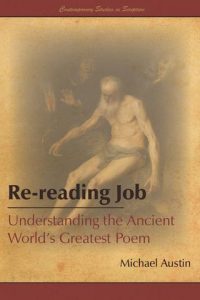 In 2010 Greg Kofford Books shifted its business strategy. The number of books published a year tripled, with an average of nine books published annually from 2011 to 2016. Also, in 2010 Kofford hired Loyd Isaiah Ericson, eventually made him managing editor of the company, in charge of day-to-day operations. Ericson had met Kofford while pursuing Mormon studies at Utah Valley State College, and he joined the company after pursuing a master’s degree in philosophy of religion and theology at Claremont Graduate School. You can listen to an interview with Ericson about his faith journey and his work at Greg Kofford Books on this Exploring Sainthood podcast.
In 2010 Greg Kofford Books shifted its business strategy. The number of books published a year tripled, with an average of nine books published annually from 2011 to 2016. Also, in 2010 Kofford hired Loyd Isaiah Ericson, eventually made him managing editor of the company, in charge of day-to-day operations. Ericson had met Kofford while pursuing Mormon studies at Utah Valley State College, and he joined the company after pursuing a master’s degree in philosophy of religion and theology at Claremont Graduate School. You can listen to an interview with Ericson about his faith journey and his work at Greg Kofford Books on this Exploring Sainthood podcast.
 Ericson has continued the company’s focus on historical and theological scholarship. The company has also moved into publishing about current issues in Mormonism, and more scripture studies, such as Michael Austin’s Re-Reading Job: Understanding the Ancient World’s Greatest Poem, which won the 2015 AML award for Religious Non-Fiction. Perhaps most interesting for readers of this blog, they also
Ericson has continued the company’s focus on historical and theological scholarship. The company has also moved into publishing about current issues in Mormonism, and more scripture studies, such as Michael Austin’s Re-Reading Job: Understanding the Ancient World’s Greatest Poem, which won the 2015 AML award for Religious Non-Fiction. Perhaps most interesting for readers of this blog, they also 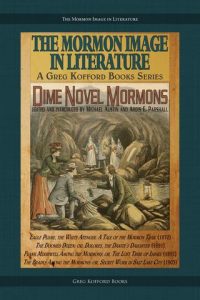 moved into publishing literary works. These include recent collections of personal essays by Boyd Petersen and Mary Bradford, a collection of essays on literary criticism and writing by Jack Harrell, the “The Mormon Image in Literature” series—a series of republicans of 19th and early 20th century literary works about Mormonism with explanatory forwards and annotations, edited by Michael Austin and Ardis E. Parshall,
moved into publishing literary works. These include recent collections of personal essays by Boyd Petersen and Mary Bradford, a collection of essays on literary criticism and writing by Jack Harrell, the “The Mormon Image in Literature” series—a series of republicans of 19th and early 20th century literary works about Mormonism with explanatory forwards and annotations, edited by Michael Austin and Ardis E. Parshall,  and two volumes of Scott Hales’s comic collection/graphic novel The Garden of Enid. Another recent innovative literary work is Iron Sharpens Iron: Listening to the Various Voices of Scripture. Editor Julie M. Smith brought together a variety of authors to pen fictionalized dialogues between various characters found in the scriptures, to “illustrate how these differences and disagreements are not flaws of the texts but are rather essential features of the canon.”
and two volumes of Scott Hales’s comic collection/graphic novel The Garden of Enid. Another recent innovative literary work is Iron Sharpens Iron: Listening to the Various Voices of Scripture. Editor Julie M. Smith brought together a variety of authors to pen fictionalized dialogues between various characters found in the scriptures, to “illustrate how these differences and disagreements are not flaws of the texts but are rather essential features of the canon.”
Situating Greg Kofford Books in the world of Mormon Studies
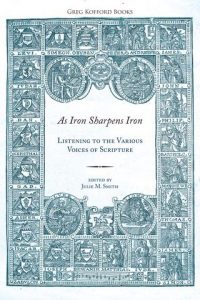 Mormon studies publishing is a niche market, in which no one is getting rich. The avenues for publication have widened in recent years, however. The publishers can be placed into three categories: LDS-church owned publishers, academic publishers, and independent publishers. LDS-church owned publishers include Deseret Book, the Church Historian’s Press, and the BYU-related publishers, which can be considered both church-owned and academic. Deseret Book is the most mass-market oriented of the publishers. The Church expects the company to stay out of the red, and although its books division is probably rarely truly profitable, the necessity of sales means that it is the most careful of the Mormon studies publishers to avoid offending orthodox sensibilities. Some of its works are academically rigorous but that does not seem to be a major factor in the decision to publish. Cedar Fort, a private publisher, also produces some Mormon studies works in the vein of Deseret Book, although with less quality control.
Mormon studies publishing is a niche market, in which no one is getting rich. The avenues for publication have widened in recent years, however. The publishers can be placed into three categories: LDS-church owned publishers, academic publishers, and independent publishers. LDS-church owned publishers include Deseret Book, the Church Historian’s Press, and the BYU-related publishers, which can be considered both church-owned and academic. Deseret Book is the most mass-market oriented of the publishers. The Church expects the company to stay out of the red, and although its books division is probably rarely truly profitable, the necessity of sales means that it is the most careful of the Mormon studies publishers to avoid offending orthodox sensibilities. Some of its works are academically rigorous but that does not seem to be a major factor in the decision to publish. Cedar Fort, a private publisher, also produces some Mormon studies works in the vein of Deseret Book, although with less quality control.
The Church Historians’ Press was founded in 2008 by the Church History Department, and specializes in publishing historical documents, such as the Joseph Smith Papers. The Religious Studies Center, part of BYU Religious Education, publishes primarily historical and scripture studies. BYU’s Maxwell Institute, started in 2006 and significantly reorganized in 2012, currently emphasizes scriptural and theological works, including interfaith scholarship. Also, their Living Faith Series features an impressive collection of essays with a more personal and literary approach to religion and Mormonism. In 2013 the Maxwell Institute acquired Salt Press, a tiny independent Mormon studies publisher. All of these institutions are supported directly or indirectly by the LDS Church, with the backing and limitations that come with that relationship. They do not, however, face the same profit concerns as Deseret Book.
University presses are supported by their host institutions, and, like the later group of Church-backed publishers, do not have the immediate need to make a profit on their books. They appeal to scholars both for their more rigorous peer-review process, the academic recognition that comes with that process, and the opportunity to be received by a larger world of scholars beyond the Mormon studies world. Among the university presses with active Mormon studies series are Oxford University Press, University of Illinois Press, University of Utah Press, and Fairleigh Dickinson University Press.
Independent publishers lack the institutional support of the LDS Church- and University-supported institutions. The two leading independent presses in Mormon studies, however, are supported by wealthy backers, which gives them some room to maneuver without having to show an annual profit. Signature Books was founded in 1980 by George D. Smith, and he still owns the house, as well as an investment company, Smith Capital Management. Signature has the reputation for being on the far left or progressive side of Mormon studies, often publishing books by former members and critics of the LDS Church. However, it publishes a wide variety of works, including works by believing Church members.
Greg Kofford, also an investment banker, is said to see his company as a labor of love, and therefore does not expect it to make a profit. I have heard it said, however, that Signature Books is backed by a much more substantial endowment, which allows it to spend more on publishing and marketing and more wiling to lose money than its newer competitor.
One author described the range of works Greg Kofford Books publishes in this way:
They have done an exceptional job of developing the niche between Deseret and Signature–i.e., they are willing to publish material that would offend most orthodox Mormons, but they are also willing to publish books that more liberal and scholarly Mormons consider apologetic. They are not primarily an academic press, and their distribution channels for scholarly books don’t stand up to Oxford, Illinois, or other university presses. But they are a good, full service publisher with innovative production and distribution strategies that have managed to fill a niche in Mormon studies between Deseret and Signature on the orthodoxy scale and between Deseret and Oxford on the scholarly scale.
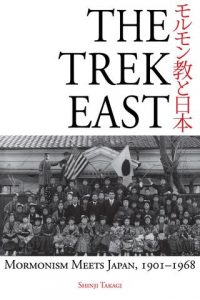 Greg Kofford Books has been able to distribute its books through the Deseret Book website, and sometimes its books are stocked on the store shelves. This sets it apart from Signature Books, whose works are usually kept out of Deseret Book. In 2015 the company created Authorcast, a podcast in which Brian Whitney, the Kofford Books publicist, interviews authors and produces “This Month in Mormon Studies,” a monthly review of LDS books and scholarship.
Greg Kofford Books has been able to distribute its books through the Deseret Book website, and sometimes its books are stocked on the store shelves. This sets it apart from Signature Books, whose works are usually kept out of Deseret Book. In 2015 the company created Authorcast, a podcast in which Brian Whitney, the Kofford Books publicist, interviews authors and produces “This Month in Mormon Studies,” a monthly review of LDS books and scholarship.
Authors speak about Greg Kofford Books
I spoke to seven authors who have published with Greg Kofford Books over the last decade. Their responses were largely positive toward the company. While several authors noted that the production and marketing budget could not equal other publishers, the small staff was complemented for their skills. Brian Whitney, the current head of marketing, managing editor Loyd Isaiah Ericson, and previous employees Bradley Kramer and Jacob Baker were all praised for their efforts.
One author said of the company:
Checks come regularly. The contract is professional. Everything is up front. I can’t say the same for other publishers that have a larger market share. They allow the author to be involved in layout and design, which is rare nowadays. The editing could improve, but few books are error-free. Over the last few years they have greatly improved in this area. Their marketing is great. They assign a person to be your publicist, arrange events, and regularly publicize your book, even if it has been a few years since it hit the shelves. Financially, I think they are on the edge, but with their use of publishing-on-demand, they are doing better than they used to. GKB is one of the best publishers to work with in the area of Mormon studies.
Another author said:
They have been willing to take risks on books that other presses have not been, primarily, I suspect, because they use a kind of just-in-time inventory process that avoids printing and warehousing large print runs. Their staff is small, but they are responsive, and they promote books as much as a promotion staff of one can.
Another author stated:
Considering the budget they have, [their services are] quite good. However, due to resources, they are easily outspent by other publishers. I think about Signature’s book on the Council of Fifty and how they had a full buffet at Benchmark. That costs money that GKB doesn’t have. The funding issue may forever relegate them to a lesser position, but I’ve learned that while their books may be criticized, their products have the power to change peoples’ beliefs on key ideas. Their critics can go after their shoestring budgeting (sometimes), but the content of many of their publications is still as good as anything out there.
One more critical author said:
Their advantages are: turn-around time, connections — especially online — to the LDS community, and ability to place books in Deseret Book stores. Their disadvantages are that their editing is quite poor. They seem to err on the side of producing too many titles. There isn’t peer review. (On the other hand, peer review is kind of a joke in the LDS community in general.) And they don’t seem to be able to get titles much beyond the bubble of connected progressive Mormons. I think they are doing a great service to the LDS intellectual community by being a venue for getting edgy books into DB stores and getting the books out there. There seems to be good synergy between GKB and [the Provo bookstore and gallery] Writ & Vision, which makes sense since Bradley Kramer is part-owner of W&V. They have panel discussion of books from GKB and other publishers on nearly a monthly basis, and get huge turnouts for phenomenal discussions.
Another author stated:
It fills a gap that has long existed within the field of Mormon publishing between the True Believing Deseret, which takes few risks and is often quite boring, and the more-risky Signature, which is often branded with the labels like anti-Mormon or apostate (which I don’t think they deserve, btw). University presses primarily serve the academic market and there is often crossover into the general market, but GKB stands out as publishing serious books aimed primarily at Mormons. I think the editing is mostly pretty good. Loyd is great to work with. The principal weakness I see is often in book design and production. I think some of the cover designs are just not very engaging. I would love to see them employ a professional design person.
Another commenter who was otherwise enthusiastic about the publisher, called its covers “mediocre and uninspired.” On the other hand, one author expressed great pleasure with the their cover art. Ericson has said that he does many of the book designs himself.
A person familiar with the company wrote:
Financially, they fulfill their obligations. But I also think that over the years the physical quality of their publications has gone down, despite their price going up. They use print on demand services, and while the paperbacks are an OK quality, the hardbacks are a very low quality and severely overpriced. You can get a better, hard bound book from any of the Mormon studies publishers at a more affordable price. I also understand [that their budget is stretched], so I am reluctant to give them a poor rating for this. As a business I would rate them as above average, but not amazing. … Philosophy and theology is a niche that needs to be filled, but I think it would have more success if a more diverse set of philosophical and theological views were represented. Loyd and his friends are enamored by a particular progressive branch of philosophy/theology, and other points of view don’t tend to get past Loyd’s review.
Another author wrote,
The Greg Kofford team is a scrappy crew. They’re working on a tight budget in a limited market, all with the hope of making quality Mormon scholarship available to the reading public. They act quickly and were impressively flexible during the editing process. They enjoy a reasonably good relationship with Deseret Book and thus, make and thus, make books on topics other than Why Your Life is A-OK or Mormon Parenting for Dummies (imaginary titles) accessible to the public on a broader scale than Deseret Book has (with the Givens volumes excepted). And given the dominance of Deseret Book in the market, it’s essential that a publishing house such as Greg Kofford exist; otherwise, the corpus of Mormon publishing would be defined by a particular brand of Mormonism that stretches from Provo to 4500 South. For this, they deserve much credit and praise.
I invited the staff at Greg Kofford Books to make a comment for this profile. Brian Whitney responded with this statement.
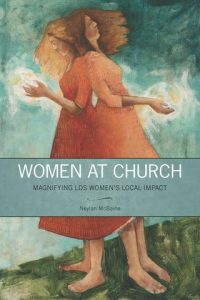 Greg Kofford Books is proud of the authors whom we have worked so closely with and of the titles that we have published, a number of which have won awards from scholarly associations. As a testament to the quality and importance of our work, we are proud to see our authors and titles repeatedly cited and utilized in other scholarly works and by both the LDS Church History Department and the occasional LDS General Authority. Being part of the ongoing conversation within Mormon history, philosophy, and theology, is our passion. It is no secret that book publishing has grown increasingly challenging in our modern era of digital media, online retail, and the reduced shelf-space offered by many brick-and-mortar outlets, but we have nothing but optimism for the future of our company and the direction that we are going. We are thrilled with our ongoing series volumes, such as Contemporary Studies in Scripture and The Mormon Image in Literature, and are excited to have branched out into more literary genres with our personal essay titles and, most recently, our first graphic novel. Most of all, however, we couldn’t survive without our loyal customers who trust us to put out books that are thoughtful, engaging, and important. We have many great projects in the works that will continue adding richness to the broad conversations happening within Mormon studies.
Greg Kofford Books is proud of the authors whom we have worked so closely with and of the titles that we have published, a number of which have won awards from scholarly associations. As a testament to the quality and importance of our work, we are proud to see our authors and titles repeatedly cited and utilized in other scholarly works and by both the LDS Church History Department and the occasional LDS General Authority. Being part of the ongoing conversation within Mormon history, philosophy, and theology, is our passion. It is no secret that book publishing has grown increasingly challenging in our modern era of digital media, online retail, and the reduced shelf-space offered by many brick-and-mortar outlets, but we have nothing but optimism for the future of our company and the direction that we are going. We are thrilled with our ongoing series volumes, such as Contemporary Studies in Scripture and The Mormon Image in Literature, and are excited to have branched out into more literary genres with our personal essay titles and, most recently, our first graphic novel. Most of all, however, we couldn’t survive without our loyal customers who trust us to put out books that are thoughtful, engaging, and important. We have many great projects in the works that will continue adding richness to the broad conversations happening within Mormon studies.

Thanks for the article, Andrew. I’ve put two of the books you posted covers for on my next month’s book-buy list.
Or I tried to. One of them, THE TREK EAST (publication date of Sept. 27, 2016) seems to be out of print already. (How a print-on-demand paperback can end up out of print after only five months these days suggests a curious business model indeed.)
Trek East isn’t out of print. Assuming you are trying to order it from Amazon, it is merely out of *stock* there–meaning that Amazon sold the inventory they had and are waiting for more copies from the POD printers.
It is available http://gregkofford.com/products/trek-east
I just came across this informative review. I’ve been getting the Kofford Books emails for a long time, but I’ve never known their story. Thank you!
Thanks for the review. I have been following the story of Signature Books since 1980 and now see how Kofford Books is successfully competing. The Joseph Smith Papers were spurred on by the lack of transparency that was revealed in great detail by the publications from SB. The publications of KB could open the door to better interpretations and re-interpretations of traditional “collective memories” in the LDS communties.